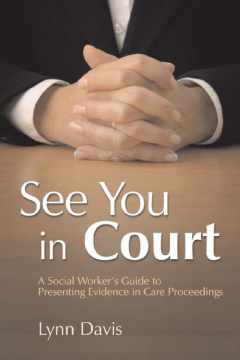
Additional Information
Book Details
Abstract
'This engaging and perceptive book fills a significant gap in the market. Whilst there are sound textbooks on the content and application of the law to social work practice, courtroom skills have received more complacent attention and Davis now challenges this robustly. In content the book deals comprehensively and informatively with the role of the social worker in the presentation of evidence and professional self in care proceedings. The strengths of the work are reinforced by the clarity of the author's style and structure, and the authenticity of the illustrative examples. These experiences of the author convey the reader direct to the courtroom and help make the book as readable as a good novel. Reflective questions are provided to help the reader to engage with the most important issues. Throughout her book Davis shows a clear concept of the professional role of the social worker and is empowering of good practice. Furthermore she never wavers from the centrality of the welfare of the child and her book shows sensitivity and commitment as well as informed practicality. This is an excellent and accessible book which gives an informed and practical introduction to courtroom skills to student social workers, but would also be valuable, and attractive in its vibrancy, to refresh the courtroom and evidence-gathering skills of more experienced social workers, including those in practice with clients other than children. I will be recommending this book to law students at level two but will also be recommending this work for the Social Care Library of the Local Authority for use by qualified staff and for training.' - Social Policy and Social Work Subject Centre (SWAP) 'Although written from the perspective of children and families social workers and covering mainly English legal proceedings, Davis's book should prove useful to all British social workers as a general guide to giving evidence in court… This book should be essential reading for social workers. It will undoubtedly help them to overcome their initial fears about going to court, providing practical tips to help improve giving evidence and coping with cross-examination.' - Involve Magazine Are you looking forward to giving evidence? What do you have concerns about? Do you know how to prepare written evidence that will be taken seriously in court? See You in Court is an accessible guide for social workers on being a witness in care proceedings. With little training and few resources available, social workers can find preparing for court a daunting part of their role. This book answers questions frequently asked by social workers in real cases, and gives information on court structures, basic rules of evidence, the roles of those involved in the proceedings, and court etiquette. It also discusses the process of giving evidence, including how to deal with cross-examination. The material is supported by case studies and checklists. This practical book is essential reading for social workers, particularly those working with children and families.
Table of Contents
| Section Title | Page | Action | Price |
|---|---|---|---|
| Abbreviations and Addresses | |||
| Glossary of Meanings | |||
| Preface | |||
| Acknowledgements | |||
| 1 The Challenge to Change | |||
| 2 Normal Error | |||
| 3 Professional Realities | |||
| 4 The Transfer of Reality | |||
| 5 All Power Deceives | |||
| 6 Learning to Learn | |||
| 7 What Works and Why | |||
| 8 Poor People's Realities: Local, Complex, Diverse, Dynamic and Unpredictable | |||
| 9 The New High Ground | |||
| 10 Putting the First Last | |||
| Postscript: Past and Future | |||
| PRA Contacts and Sources | |||
| Notes | |||
| References | |||
| Index |
